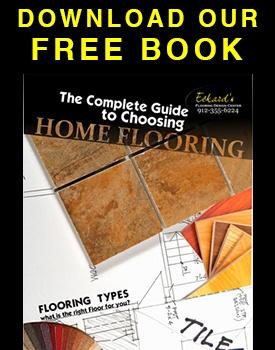If you’re moving into a previously owned home, or you’re simply thinking that it’s time for a change in your current residence, getting new floors is one of the renovation decisions that is both pleasing to the eye, and can add new value—and comfort—to a home. The floor is often something people forget about when looking at home improvement, as furniture, light fixtures and paint on the walls are typically more noticeable.
But a floor is important not just as something that people walk on, stand on, and rest their furniture on. It is the literal foundation on which the rest of a room rests both physically and aesthetically. With the right floor and complementary decor, the tone of an entire room can change.
Here in Savannah, homeowners have a lot of different options for flooring. As we’re generally blessed with milder winters and warmer temperatures, many types of hard surfaces are more practical, due to the high humidity of the area. However, this doesn’t mean that other floor types are not viable, simply that an extra level of care may be required to keep them in good shape.
Here’s what Savannah homeowners can expect with the types of floors they may be thinking of putting in their home.
Carpet
Always a popular choice, carpet is soft, feels very comfortable, guarantees floors don’t feel cold, and comes in a variety of colors and textures. It’s always a good choice for bedrooms, studies, and even living/family/rumpus rooms. It’s not recommended for kitchens, bathrooms or dining rooms where there’s a higher likelihood of liquids and spills.
Because carpet is a fabric, it’s a pleasant looking and feeling material, but extra care needs to be taken with maintenance. Spills are not so easily wiped away, and, if neglected or not occasionally inspected, high humidity can make carpet a potential site for mold or fungus to breed. If you’re willing to take on a little extra responsibility for maintenance, however, it’s a comfortable choice.
Hardwood
A traditional and very popular hard surface choice, hardwood always lends a classic, warm feel to any room. These days, homeowners have two choices with this surface. There’s traditional hardwood, which is simply solid strips of wood laid out on the floor. Then there’s a more recent development called “Engineered Hardwood,” which is a composite of treated wood materials processed to resemble traditional hardwood.
Engineered hardwood may be a better choice in humid climates, as the treatment and construction process makes it more resilient to the higher amounts of moisture in the air. Changes in humidity can cause traditional hardwood to expand and contract, while the layers of engineered hardwood are much more resistant to this.
Tile
This has always been an extremely popular choice since it fits in with so many different rooms. Tile comes in different materials, from natural stone to artisan designed ceramic, so there are many different options in terms of material. Because it’s a hard surface, it’s easy to maintain, but because it’s not organic, like wood, it’s likely to last an incredibly long time.
The only point of caution with tile—and this depends entirely on the material chosen—is chips and scratches. An heavy object with a sharp corner may, when dropped, actually impact on tile and chip it, while heavy furniture that is dragged across tile instead of being lifted may cause scratch marks. However, tile is very easy for cleaning spills, as a simple wipe with a cloth or swab with a mop is all it takes.
Whatever kind of floor you’re looking for, balance your preference for style with the needs of the room. With the right balance, you can enjoy years of quality with a great looking floor that fulfills the function of that room.



